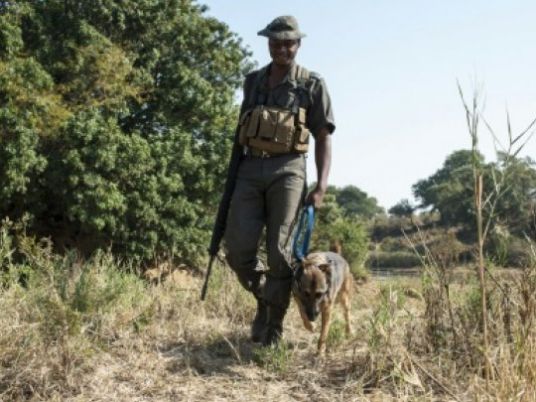
A prosecutor in South Africa's Kruger National Park says rhino poaching cases appear in court like "shoplifting cases in the city", casting doubt on the country's anti-poaching strategy as it suffers another year of rhino carnage.
For the past six years, prosecutor Ansie Venter has been working on rhino poaching cases in Skukuza Magistrates' Court, the legal heart of the world-famous park.
Yet despite a high conviction rate, Venter is still seeing waves of people coming through the court in connection with poaching, a state of affairs that riles her.
"I think it's still getting busier by the day," said Venter, a 54-year-old woman with auburn hair wearing a black and white striped silky shirt. But, she said, "our hands are virtually tied".
South Africa is on track to see another record year of rhino poaching. Last year, 1,215 rhinos were killed for their horn, used in East Asia for its supposed medicinal qualities.
In the first four months of 2015, 393 rhinos were killed, a more than 18 percent increase over 2014, environmental affairs minister Edna Molewa said earlier this year.
In the Skukuza court, on a warm morning in June, Venter pushed for the imprisonment of Elliot Mzimba, a man wearing faded blue jeans, sitting with hunched shoulders in front of the judge.
The 43-year-old father of six from Mozambique was arrested earlier this year in Kruger park with a .375 caliber hunting rifle and ammunition.
Through a translator speaking Tsonga, Mzimba pled guilty to all the charges — trespassing, illegal possession of a firearm and ammunition and intent to commit a crime — and was sentenced to seven years in jail.
"I think the higher the sentence, the bigger the deterrent," said Venter.
"But no matter how much we despise and hate the people we catch, they are usually the uneducated poor people at the low end of the food chain who are simply desperate for an income."
Weak laws?
South Africa does not have specific legislation designed to address rhino poaching.
As a result, prosecutors have to push for the maximum sentences of what used to be relatively innocuous offences, including trespassing and illegal possession of a firearm and ammunition.
But many poachers slip through legislative cracks by getting bail, escaping the country and receiving no punishment at all.
"Mozambique has not signed any extradition treaty, which means they flee and do not come back to court, in which case justice obviously is not served," said Venter.
Activists have decried the lack of cooperation between South Africa and Mozambique on the poaching crisis.
Dex Kotze, a South African organizer of the global march for elephants and rhinos, has been lobbying the government to make rhino poaching a "schedule 5 offence" along with murder.
"A heavier sentence is going to be a deterrent," said Kotze.
"The suggestion is if found guilty, a poacher has to get 15-years minimum sentence, and refund the value of the poached rhino to the owner."
The fact that the laws haven't been amended or that an extradition treaty hasn't been signed with Mozambique points to "a lack of political will", said Kotze. "It's disgusting".
Julian Rademeyer, author of Killing for Profit, a book on rhino poaching, said that authorities need to arrest the kingpins, not the footmen.
"We're not making inroads. A lot of it is about quick arrests, quick convictions, it's not about building up proper organized crime cases," he said.
"Law enforcement efforts are very much behind the curve, the international crime syndicates are often 10 steps ahead of them.
"The resources aren't there. Government talks about it as a priority crime, but there are so many priority crimes, it quite frankly is down on the list."
In the Kruger, Venter sees almost every poacher arrested in the park pass through the court, a small brick building with tile floors and windows framed with green gingham curtains.
Next door, the detained men, most of them Mozambique nationals illegally in South Africa, sit handcuffed and behind bars, waiting to appear in front of the judge.
Venter hopes her work is helping to deter aspiring poachers.
"Somehow we have to believe and we must believe that passing stiff sentences will help," she said.




